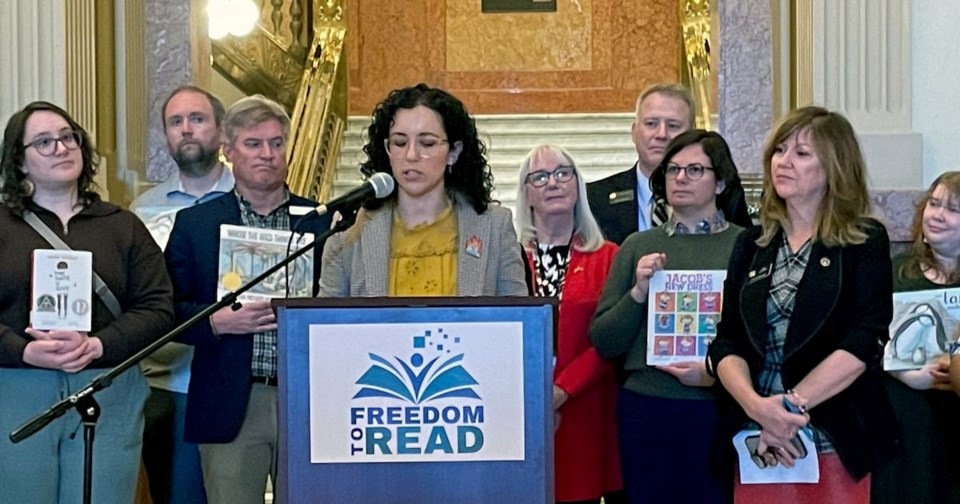This story was originally published by Chalkbeat. Sign up for their newsletters at ckbe.at/newsletters
Some Colorado lawmakers want to make it harder to pull books from the shelves of public libraries and school libraries, especially when the challenges come from people who live outside the community.
Sen. Bill 24-49 would create a standard process through which books or other library materials could be challenged and outlines the makeup of school district committees that would have the authority to remove books from school libraries. The bill also spells out who can submit a book challenge. At a school library, challengers could be an enrolled student or the parent of a student. At a public library, a resident of the local library district could challenge a book.
The bill, which will be heard by the Senate Education Committee on Feb. 22, comes at a time when book bans and challenges are more prevalent than they’ve been in decades. Often, those challenging books raise objections about how subjects like race, racism, or LGBTQ issues are handled. In some cases, dozens of challenges originate with one person.
During a press conference Monday in the State Capitol building, Sen. Lisa Cutter, a Jefferson County Democrat and co-sponsor of the bill, framed the measure as a way to ensure young people in Colorado have the freedom to read, including books that “might challenge preconceived notions or present uncomfortable truths.”
While Cutter and others spoke, supporters of the bill, including from the state teachers union, the American Civil Liberties Union, and the LGBTQ advocacy group One Colorado, held up books that have been banned in the past — titles like, “Where the Wild Things Are,” “Hunger Games,” “The Hate U Give,” and “Anne Frank: The Diary of a Young Girl.”
Lily Williams, a Colorado teacher and illustrator, also spoke at the press conference, recounting how her graphic novel, “Go With the Flow” was banned in Keller, Texas, in 2022. The book is about “growing up, best friends and getting your first period,” she said.
Williams, who teaches art at Carlson Elementary in Idaho Springs, talked about meeting a middle school girl during the book tour who confessed that she didn’t have anyone to talk to about puberty.
“When adults censor and ban books, important conversations and questions don’t suddenly stop,” she said. “Those conversations and questions and simply move to a less safe space.”
Williams said after the press conference that she hopes the bill will provide checks and balances so that book challenges aren’t quite so “free-form.”
The bill specifies that a committee appointed by the school district superintendent would consider challenges to school library books. The committee would include a district administrator, three teachers, three principals, a parent on the District Accountability Committee, and a student or recent graduate. It also would include three parents whose children are students of color or part of the LGBTQ community. The bill says a book could be removed only if the committee unanimously approves.
Cutter’s bill is a response to the book bans debated recently in Douglas County and nationally.
In August, conservative activist Aaron Wood requested the removal of four books that featured LGBTQ content. The Douglas County library board rejected the appeals by Wood.
Nationally, there’s been a surge in book bans, according to the American Libraries Association. From January to August 2023, Colorado libraries heard eight challenges of 136 titles. And across the nation, there were 531 attempts to ban books with over 3,900 book titles challenged from January to August 2023.
The most sweeping challenges have come from a handful of conservative organizations, including Moms for Liberty, according to the Associated Press. Cutter said she doesn’t want that to happen in Colorado, and the bill outlines the criteria for a challenge.
“You can’t just come from out of state,” she said.
Some Colorado education groups want to see the bill amended.
“Obviously, as school administrators, we support access to materials in school. That’s terrific,” said Bret Miles, executive director of the Colorado Association of School Executives.
But he said the bill should be pared down to allow more flexibility because it’s too prescriptive about how school districts make decisions about library books.
“These are the kinds of decisions that are best left to a local community,” he said.
Michelle Murphy, executive director of the Colorado Rural Schools Alliance, said the bill essentially excludes local school boards from developing their own book challenge policies or deciding the makeup of committees in charge of book removal decisions.
She said the alliance is still hoping to work with the bill’s sponsors to come up with amendments that would make it more palatable.
After the press conference, Cutter said she and other lawmakers are working on amendments to the bill.
“We’re trying to relax the committee structure and the process so that it’s not onerous for school districts and rural schools,” she said. “We started out probably too prescriptive.”
Reporter Jason Gonzales contributed to this report.
Ann Schimke is a senior reporter at Chalkbeat, covering early childhood issues and early literacy. Contact Ann at [email protected].
Chalkbeat is a nonprofit news site covering educational change in public schools.



